As a skilled AM broadcast DX listener, I was familiar with the big AM stations transmitting from New York. They all had their special styles in the 1970s and 1980s. Each, in their own way, gave a special "larger than life" mystique to that ambitious city 200 miles northeast of my hometown of Baltimore, Maryland. It seemed to have a special "sizzle" but was always just out of reach by radio. The AM stations would fade to the noise at sunrise, air-band VHF traffic was just barely audible on good days, and television was out of the question. Or perhaps not?
One day, sometime during the summer of 1980, I had been listening to some hams on 40 meters describing a VHF band opening. One fellow was getting television and 6 meter signals from New York. Another noted that tropospheric propagation was great during the hot, stagnant, high pressure weather presently in the Northeast. That was enough for me to attempt reception of New York television later that evening.
In Baltimore, the VHF TV band was a crowded place. We had channels 2, 11, and 13 occupied by WMAR, WBAL, and WJZ, respectively. Washington DC had channels 4, 5, 7, and 9. Lancaster, Pennsylvania had a weak signal on channel 8. Weaker signals from Philadelphia were on channels 3, 6, and 10. All of them could cause interference in my attempts to find signals from Ne York.
At my disposal, very late in the evening when local stations signed off, was a modest Zenith television, with a 10 element log periodic at the end of about 75 feet of 300 ohm twinlead and no preamplifier.
I\'ll always remember what I saw when the Baltimore and Washington stations on the low VHF channels signed off: a fair signal from channel 3 in Philly, and detectable video on channels 2, 4, and 5 from New York! I spent the entire time switching between the channels, adjusting the tuning, and going to the roof to aim the antenna for best signals. That first night was an eye opener, and showed that it was possible to receive television from New York in Baltimore. That year, I was able to see stable video and hear fair audio during some of the better tropo openings. Later, with the addition of a mast mounted pre-amplifier, I was able to receive better signals - enjoying some local programming on WPIX, who had the slogan "Eleven Alive" at that time. Signals had a diurnal pattern of best tropo in the pre-dawn hours, plus a seasonality favoring spring and summer. Sometimes warm fronts would stall in the area, and I would enjoy some good enhancement not related to the daily temperature inversion phenomena. There tended to be lots of multipath flutter from aircraft flying the corridor between the Baltimore-Washinhton metroplex and the New York - Newark area.
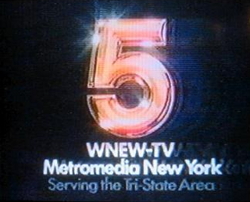
WNEW Logo |
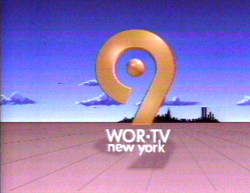
WOR Logo |
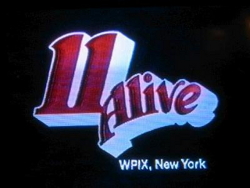
WPIX Logo |
Eventually I learned that the good signals possible at that 200 mile distance were due in part to the movement of television transmitters from the Empire State Building to the World Trade Center in the 1970s. These were the stronger stations; WOR, remaining at the Empire State Building was weaker in Baltimore.
During the winter of 1980 - 1981, I went for a visit to New York, and of course, brought along a receiver to explore the air-band and two meters. We visited the World Trade Center observation deck, on WTC-2, and I was thrilled to see those immense TV antenna masts up close! Also, one had a commanding view up the Hudson river, down the Jersey Shores, and toward the Pocono Mountains.
Nearby were the three major airports: Laguardia, Kennedy, and Newark. Air-band listening from atop World Trade Center #2 was incredible. All three airports were full strength. Aircaft approaching from the south (over Yardley, Robbinsville, and SATES), that were barely audible in Baltimore, were quite strong. One could follow these flights throughout landing and taxi-in, with a visual too...It was incredible.
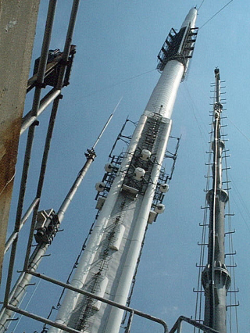
World Trade Center 1 Television and FM Antennas |
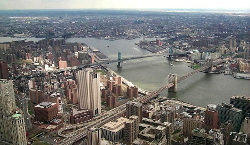
Two World Trade Center Observation Deck East |
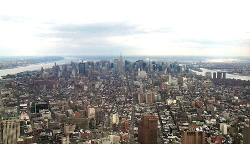
Two World Trade Center Observation Deck North |
Later in life, as I worked as a flight instructor at White Plains, I would fly past the WTC towers (looking UP from the 800 ft Hudson VFR corridor) and recall fondly those days when I was a radio tourist, when it was difficult and special to pull in radio or television from New York City. Later, I discovered the area was a fun place to stroll on days off, and it had some of the best coffee shops in the city.
Those buildings and their immense antennas were not to endure; read on about the efforts of New York stations to stay on the air after the September 11 attacks. Where was I during the 9/11 events? On a jetliner that had to turn around and land ASAP! Read about Amtran 751 here
© 2005 - 2026 AB9IL.net, All Rights Reserved.
Written and curated by Philip Collier / AB9IL.
About Philip Collier / AB9IL, Commentaries and Op-Eds, Contact, Privacy Policy and Disclosures, XML Sitemap.